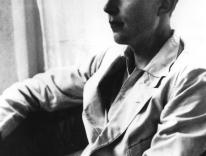 He's Ross Douthat, erstwhile Atlantic editor and blogger and a serious upgrade from William Kristol, who started badly--not entirely unexpectedly--and went down from there during his year-long stint, which ended--not entirely unexpectedly--a couple months back.I'd hoped thatDouthat would get the nod--and obviously that went into Sulzberger's decision-making process--despite the fact that he's so bloody smart and so bloody young (29 years old):
He's Ross Douthat, erstwhile Atlantic editor and blogger and a serious upgrade from William Kristol, who started badly--not entirely unexpectedly--and went down from there during his year-long stint, which ended--not entirely unexpectedly--a couple months back.I'd hoped thatDouthat would get the nod--and obviously that went into Sulzberger's decision-making process--despite the fact that he's so bloody smart and so bloody young (29 years old):
Asked when The Times last had such a young columnist, Andrew Rosenthal, the editorial page editor, said, I dont think ever.
Douthat will also bring a Catholic sensibility on ethics and morals and social justice to the page, and of course a politically conservativedisposition. Hey, he has time to learn--look how fast David Brooks is backpedaling under the onslaught of reality! And some question Brooks' conservative bona fides anyway.Douthat may suffer similar slings and arrows, given someof the heterdox views he and Reihan Salam wrote about in their book, "Grand New Party." (Jim Sleeper reviewed it for Commonweal.)In his writings at The Atlantic, Douthat has oftenbeen brutally honest about the failings of the GOP in the last election, politically and ideologically.Read Damon Linker's welcome at TNR,in which Douthat's frequent sparring partner opines:
Ross's appointment represents a broadening of debate in the mainstream media. Unless I'm mistaken, he will be the first pro-lifer ever to write a column for what is still (by a wide margin) the premier daily newspaper in the United States. That he's also a committed orthodox Catholic who enjoys (and excels at) defending his beliefs against critics both serious and silly is a real bonus. Too many pro-life and devoutly religious Americans fall into one of two camps: Either they lack the intellectual ability to engage in conversation and argument with the wider culture, or else they use their intellect to rally their own side for political battle, content to mock and dismiss those outside their ranks. Ross deftly avoids both vices in his writing -- and American public life will be elevated because of it.
And his colleague Marc Ambinder reminds us it's pronounced dow-that -- with a soft "th."


